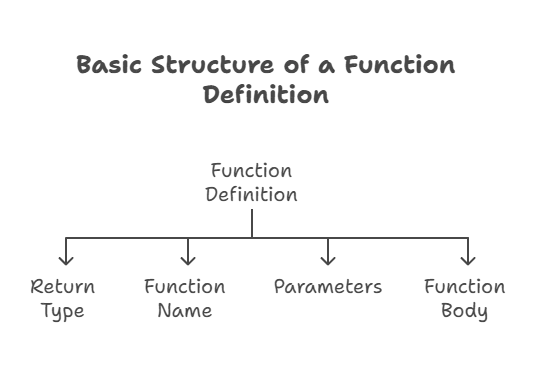Function Definitions
In C++, a function definition provides the actual implementation of a function, specifying the behavior and functionality of the function. Function definitions consist of the code block that executes when the function is called. Understanding how to define functions in C++ is essential for building modular and maintainable code.
Basic Structure of a Function Definition
A function definition in C++ typically includes the following components:
- Return Type: Specifies the data type of the value returned by the function. It can be
voidif the function doesn’t return any value. - Function Name: The identifier that uniquely identifies the function.
- Parameters: Input values passed to the function. They are optional, and a function can have zero or more parameters.
- Function Body: The block of code enclosed within curly braces
{}that defines the functionality of the function.

Writing Function Definitions
When writing function definitions, consider the following guidelines:
- Ensure that the function name, return type, and parameter list match the function declaration.
- Implement the desired functionality within the function body.
- Return a value (if applicable) using the
returnstatement.
// Function definition for finding the maximum of two numbers
int max(int a, int b) {
if (a > b) {
return a;
} else {
return b;
}
}
Inline Functions
An inline function is a function that is expanded in place at each point where it is called, rather than being invoked through a function call. The inline keyword is used to declare a function as inline.
Advantages of Inline Functions:
- Reduced Function Call Overhead: Since the function body is directly substituted at each call site, there’s no overhead of function call setup and teardown.
- Performance Improvement: Inline functions can potentially improve performance by avoiding the overhead associated with function calls, especially for small and frequently called functions.
- Code Size Reduction: Inline functions can lead to smaller code size by eliminating the need for separate function calls.
// Inline function definition
inline int square(int x) {
return x * x;
}
int main() {
int result = square(5); // Inline expansion
return 0;
}
Recursive Functions
A recursive function is a function that calls itself either directly or indirectly to solve a problem. Recursive functions are useful for solving problems that can be broken down into smaller, similar subproblems.
Key Components of Recursive Functions:
- Base Case: A condition that terminates the recursive process by returning a value without making further recursive calls. It prevents infinite recursion.
- Recursive Case: The case where the function calls itself with modified arguments to solve a smaller instance of the original problem.
// Recursive function to calculate factorial
int factorial(int n) {
if (n == 0 || n == 1) {
return 1; // Base case
} else {
return n * factorial(n - 1); // Recursive case
}
}
int main() {
int result = factorial(5); // Calculate factorial of 5
return 0;
}
Explanation:
- In the
factorialfunction, the base case is whennis 0 or 1, where the function returns 1. - In the recursive case, the function calls itself with
n - 1and multiplies the result withn, effectively calculating the factorial ofn.
Examples
Function with No Return Type and No Parameters
// Function definition with no return type and no parameters
void greet() {
std::cout << "Hello, world!" << std::endl;
}
Explanation:
- This function named
greetdoes not return any value (void) and does not accept any parameters. - It simply prints “Hello, world!” to the console when called.
Function with Default Parameter
// Function definition with default parameter
int multiply(int a, int b = 1) {
return a * b;
}
Explanation:
- This function named
multiplytakes two parametersaandb, wherebhas a default value of1. - If the
bparameter is not provided during the function call, it defaults to1.
Function with Reference Parameters
// Function definition with reference parameters
void swap(int& a, int& b) {
int temp = a;
a = b;
b = temp;
}
Explanation:
- This function named
swaptakes two integer parametersaandbby reference. - It swaps the values of
aandbusing a temporary variabletemp.
Function with Pointer Parameters
// Function definition with pointer parameters
void printArray(int* arr, int size) {
for (int i = 0; i < size; ++i) {
std::cout << arr[i] << " ";
}
std::cout << std::endl;
}
int main() {
int arr[] = {1, 2, 3, 4, 5}; // Declare an array
int size = sizeof(arr) / sizeof(arr[0]); // Calculate the size of the array
// Call the printArray function
printArray(arr, size);
return 0;
}
Explanation:
- This function named
printArraytakes an integer pointerarrand an integersizeas parameters. - It iterates through the array
arrand prints each element to the console.
Function definitions are vital components of C++ programming, providing the actual implementation of functions and defining their behavior. By understanding the basic structure of function definitions and exploring advanced concepts such as inline functions and recursive functions, programmers can write efficient and modular code.Happy coding! ❤️
